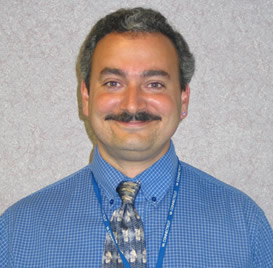Gary J. Bryson PECASE Awardee
|
Gary J. Bryson, PsyD, a rehabilitation research career development awardee, was among the 57 scientists presented the 2002 Presidential Early Career Award for Scientists and Engineers (PECASE) in a long-anticipated White House ceremony in May. The PECASE award is the highest honor the U.S. government bestows on outstanding scientists and engineers who are establishing their independent research careers. The Department of Veterans Affairs selects two nominees for the PECASE award from among scientists who have successfully competed for Career Development Awards. Dr. Bryson, a staff psychologist in the VA Connecticut Health Care System and an associate research scientist with Yale University School of Medicine, received the PECASE award for outstanding contributions to the study of schizophrenia. He specializes in cognitive rehabilitation research, investigating how people with schizophrenia recover memory, problem-solving, and attention abilities. For the more than two million Americans living with schizophrenia, cognitive rehabilitation may also help in developing life skills. |
 Gary J. Bryson, |
|
Dr. Bryson's Career Development Award study compared the effect of two cognitive rehabilitation therapies: precision learning and computerized drill and practice. Precision-learning rehabilitation uses one-on-one coaching and task activities to help improve patients' memory, attention, and problem-solving. Computerized drill and practice methods involve repetitious performance of computerized tasks that increase in complexity as the patient masters the training tasks. The cognitive training software has been adapted from existing programs used in traumatic brain injury rehabilitation. Preliminary data from this study indicate both treatments are effective in improving cognitive abilities. Interestingly, each treatment has a unique effect on different cognitive skills. The precision-learning therapy had a significant effect on verbal memory abilities, while the computerized drill and practice therapy had a beneficial effect on problem-solving. Rehabilitation therapies such as these treat the underlying cognitive deficits people with schizophrenia experience and may increase the likelihood that patients can better learn strategies to help them perform activities such as remembering to make an appointment or staying on task that improve quality of life. |
|
















